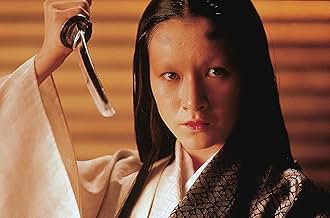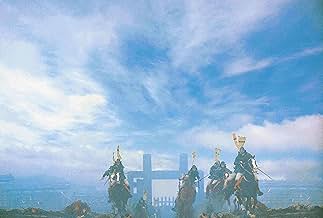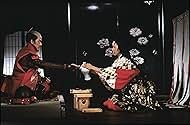En el Japón medieval, un anciano señor feudal decide abdicar y entregar sus dominios a sus tres hijos. Pero no es capaz de ver que estos nuevos poderes los corromperán y harán que acaben enf... Leer todoEn el Japón medieval, un anciano señor feudal decide abdicar y entregar sus dominios a sus tres hijos. Pero no es capaz de ver que estos nuevos poderes los corromperán y harán que acaben enfrentándose los unos a los otros y contra él.En el Japón medieval, un anciano señor feudal decide abdicar y entregar sus dominios a sus tres hijos. Pero no es capaz de ver que estos nuevos poderes los corromperán y harán que acaben enfrentándose los unos a los otros y contra él.
- Dirección
- Guionistas
- Elenco
- Ganó 1 premio Óscar
- 30 premios ganados y 23 nominaciones en total
Mansai Nomura
- Tsurumaru
- (as Takeshi Nomura)
Resumen
Reviewers say 'Ran' is celebrated for its epic scale, masterful direction, and stunning visuals. Adapted from Shakespeare's 'King Lear,' it is lauded for its intricate narrative, powerful performances by Tatsuya Nakadai and Mieko Harada, and deep exploration of power, corruption, and betrayal. The cinematography and battle scenes are noted for their grandeur. Some find its slow pace and long runtime challenging, yet it is often hailed as one of Kurosawa's finest works.
Opiniones destacadas
The 'Kurosawa' adaptation of King Lear in his film 'Ran' is a tremendous memorable film.
It is a very dramatic film with many soliloquies and dialogue, but if you are patient with it, you are treated to some of the most epic scenes of cinematic brilliance that Kurosawa made. After all it is Shakespeare and one must be patient with it if they are not a fan of the old school theatre.
Colourfull clashing armies, The lord awaiting his fate in a burning castle, a brilliant execution scene (I consider the BEST I have ever seen film ever), and the blind being left in the hands of Buddha?
While Seven Samurai will always be his perfection, Ran is more than an enjoyable movie that should be seen. Just stick with it and you'll never forget it.
Rating 9 out of 10.
It is a very dramatic film with many soliloquies and dialogue, but if you are patient with it, you are treated to some of the most epic scenes of cinematic brilliance that Kurosawa made. After all it is Shakespeare and one must be patient with it if they are not a fan of the old school theatre.
Colourfull clashing armies, The lord awaiting his fate in a burning castle, a brilliant execution scene (I consider the BEST I have ever seen film ever), and the blind being left in the hands of Buddha?
While Seven Samurai will always be his perfection, Ran is more than an enjoyable movie that should be seen. Just stick with it and you'll never forget it.
Rating 9 out of 10.
Ran takes viewers to a place they would rather not explore on their own. In a world of cruelty, Kurasowa has shown how the moments within the horror can have beauty. Shakespeare wrote King Lear as a mirror on the human condition. We do not have to be kings and princesses to identify with the father's desire for the well being of his children, even if his own life was one of cruelty and pain. We see this theme throughout great literature and film. What Ran has done is to provide the viewer with many small moments within the pain to realize the beauty. Even the moment of epiphany for Hidetora, when his actions achieve his madness, is one of surpassing beauty. As the storm rages outside the small house of the prince he blinded, whose parents he killed, whose sister he forcibly married off, the simple sounds of the flute provide an intense focus on the here and now. It is at this moment when Hidetora recognizes that he himself sowed the seeds of his own destruction. There is no dialogue, no swashbuckling, just the terrible beauty of the music. As with many of Kurasowa's films, despite their epic scope, it is the small paint strokes that make up the master's canvas.
Based on Shakespeare's King Lear, this film follows the story of the aging warlord Hidetora who, in an attempt to restore peace, divides his kingdom between his three sons - Taro, Jiro, and Saburo - and retires from his duties. However, one of his sons sees this as unwise and is banished by his father, leaving his two brothers in charge of two of the three castles left in their hands. It isn't long before they are overtaken by greed and eventually betray their father, leaving him in the hands of a philosophical jester and a loyal retainer. This betrayal ultimately leads to war, dividing the family and driving Hidetora insane.
The remarkable script, which contains many of my favorite lines from any film, still manages to break its way through the confinement of subtitles and reveals itself to be one of the richest Kurosawa ever wrote. He has obviously worked equally hard on the look and feel of the film - the cinematography being excellent (example: the long, continuous shot of Saburo's men charging on horseback across a river).
There's also something rather frightening about it that I can't quite put my finger on. The first battle, which is the film's turning point, is the most horrifying, yet strangely beautiful, battles ever filmed. A good effect used is the loss of sound, with only Toru Takemitsu's haunting score to be heard. The entire battle lasts less than ten minutes and there is no uplifting or bombastic music to be heard, but in my opinion, it's Ran's finest scene, and thus the finest scene ever.
What Kurosawa managed to get rather than give though was excellent performances from his actors, none more brilliant than Tatsuya Nakadai's Hidetora, Mieko Harada as Lady Kaede (a woman similar to Lady Macbeth but with a different hidden agenda), and the strangely-named Peter as Kyoami.
The remarkable script, which contains many of my favorite lines from any film, still manages to break its way through the confinement of subtitles and reveals itself to be one of the richest Kurosawa ever wrote. He has obviously worked equally hard on the look and feel of the film - the cinematography being excellent (example: the long, continuous shot of Saburo's men charging on horseback across a river).
There's also something rather frightening about it that I can't quite put my finger on. The first battle, which is the film's turning point, is the most horrifying, yet strangely beautiful, battles ever filmed. A good effect used is the loss of sound, with only Toru Takemitsu's haunting score to be heard. The entire battle lasts less than ten minutes and there is no uplifting or bombastic music to be heard, but in my opinion, it's Ran's finest scene, and thus the finest scene ever.
What Kurosawa managed to get rather than give though was excellent performances from his actors, none more brilliant than Tatsuya Nakadai's Hidetora, Mieko Harada as Lady Kaede (a woman similar to Lady Macbeth but with a different hidden agenda), and the strangely-named Peter as Kyoami.
One of the last great films directed by Akira Kurosawa. A father gives his land and his power to his three sons. They turn against each other and against their father.
Based on Shakespeare's King Lear 'Ran' is a very good film. It was very expensive and you can see that. Over ten years Kurosawa was busy on this project and in 1985 it was finally there. Very well made, with beautiful costumes, music and cinematography, a great direction and some good performances. Although I think Kurosawa has done better ('Rashomon', 'Ikiru', 'Yojimbo' and of course 'Shichinin no Samurai') 'Ran' definitely belongs to his best.
Based on Shakespeare's King Lear 'Ran' is a very good film. It was very expensive and you can see that. Over ten years Kurosawa was busy on this project and in 1985 it was finally there. Very well made, with beautiful costumes, music and cinematography, a great direction and some good performances. Although I think Kurosawa has done better ('Rashomon', 'Ikiru', 'Yojimbo' and of course 'Shichinin no Samurai') 'Ran' definitely belongs to his best.
Thankee kindly.
Kurosawa, while a great director, isn't somebody whose films I blindly endorse.
However, Ran takes the cake. It easily makes my personal top five films any time I think about it.
The imagery is absolutely stunning, and the dialogue is quite clever. The battle scenes are suitably horrific, and the humor (and yes, there is humor) is subtle enough not to get in the way.
All told, one of the greatest films it's been my privilege to see. I watched it to get the nightmare that was Cold Mountain out of my head, as proof that long movies can actually be epic, as opposed to boring, trite, and predictable.
Kurosawa, while a great director, isn't somebody whose films I blindly endorse.
However, Ran takes the cake. It easily makes my personal top five films any time I think about it.
The imagery is absolutely stunning, and the dialogue is quite clever. The battle scenes are suitably horrific, and the humor (and yes, there is humor) is subtle enough not to get in the way.
All told, one of the greatest films it's been my privilege to see. I watched it to get the nightmare that was Cold Mountain out of my head, as proof that long movies can actually be epic, as opposed to boring, trite, and predictable.
¿Sabías que…?
- TriviaAkira Kurosawa's wife of 39 years, Yôko Yaguchi, died during the production of this film. Kurosawa halted filming for just one day to mourn before resuming work on the picture.
- ErroresDuring the siege on the third castle, the corpse of one of Hidetora's guards suddenly shuts his eyes just before a volley of arrows flies past him.
- ConexionesFeatured in A.K. (1985)
Selecciones populares
Inicia sesión para calificar y agrega a la lista de videos para obtener recomendaciones personalizadas
Detalles
Taquilla
- Presupuesto
- USD 11,500,000 (estimado)
- Total en EE. UU. y Canadá
- USD 4,314,927
- Fin de semana de estreno en EE. UU. y Canadá
- USD 3,567
- 2 jul 2000
- Total a nivel mundial
- USD 4,385,618
- Tiempo de ejecución2 horas 40 minutos
- Color
- Relación de aspecto
- 1.85 : 1
Contribuir a esta página
Sugiere una edición o agrega el contenido que falta




































